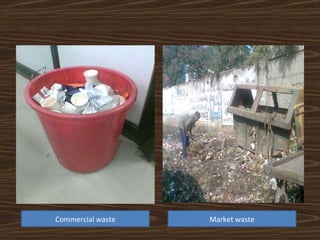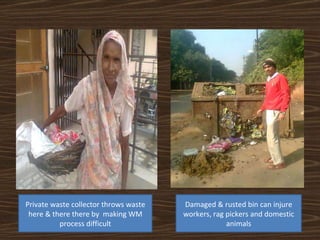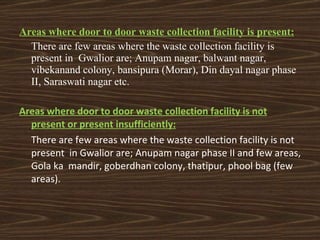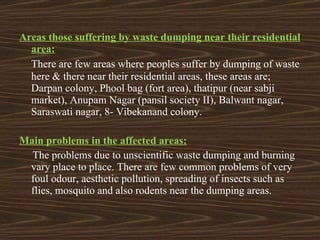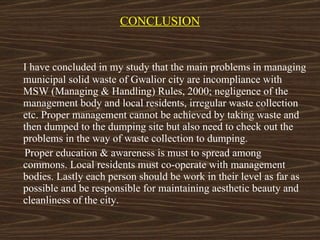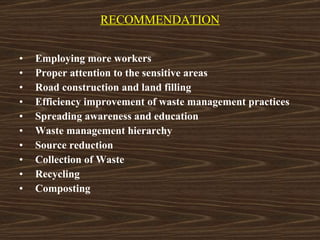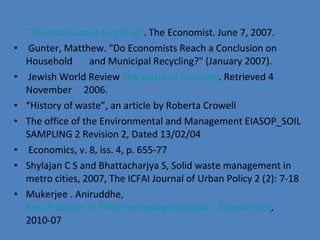Municipal solid waste management of gwalior, m.p., india
- 1. Niladri Sekhar Roy Jiwaji University, Gwalior (nroy0111@gmail.com) MUNICIPAL SOLID WASTE MANAGEMENT OF GWALIOR (M.P., India)
- 2. CONTENTS Introduction Objectives of the study Types of MSW MSWM by Gwalior Municipality and AKC DEVELOPERS LTD. Effects of MSW in Gwalior Problems in managing MSW in Gwalior Observations Conclusion Recommendations References
- 3. INTRODUCTION MSWM is drawing attention of the environmentalists all over the world. It is very important issue to clean up the city in term of MSWM. In case of Gwalior, MSWM carries out by two different bodies. Firstly, Gwalior Municipality has involved workers for street sweeping, waste collection, transportation and disposal. In Shivpuri Link road, the collected waste is being dumped and then AKC DEVELOPERS LTD. starts their work by segregating recyclables followed by compost manufacturing with the bio-degradable matters. Recyclable matters and compost are send to the concerned sectors.
- 4. OBJECTIVES OF THE STUDY To observe the present municipal waste management scenario carries out by the Gwalior Municipal Corporation & AKC DEVELOPERS LTD. To observe the problems relating to the waste management. To study the amount of the house hold waste generates per day. To observe per day per person waste generation. To observe the availability of door to door waste collection facility in various areas of Gwalior. To find out how many people through their waste here and there. To find out the waste dumping sites in various areas of Gwalior. To study the environmental awareness concerning with the municipal Waste. To find out areas with no or less waste management facilities and also that areas suffering by various problems related to the municipal waste. To recommend various alternatives for managing the waste.
- 5. TYPES OF MSW Household waste Institutional waste
- 6. Commercial waste Market waste
- 7. MSWM BY GWALIOR MUNICIPALITY AND AKC DEVELOPERS LTD. MSW is managed by both, Gwalior Municipality and AKC DEVELOPERS LTD. The private company have taken a land from the municipality for 35 years as lease and manufactures compost with the dumped biodegradable waste after segregating the recyclables. It can be said that MSW is managed in two steps. Primary step is carried out by Gwalior Municipality and the second step is carried out by the private company. 1 st step is waste collection to dumping and 2 nd step is segregation of recyclables and compost manufacturing.
- 8. STEP -1 (MSWM BY GWALIOR MUNICIPALITY) Input Consumption Reuse Products Waste Generation Throwing of Waste Rag Pickers Collect Recyclables Vendors/ Kachra Wala Manufacturing Unit Manufacturing Of New Products Private Waste Collectors Collection by Authorised Person Storage Transportation Dumping
- 9. STEP -2 (MSWM BY AKC DEVELOPERS LTD.) Biodegradable Waste Waste Dumping (Shivpuri link road) Segregation of Recyclables Remanufacturing of New Products New Products Ready to Use Compost Manufacturing Send to the Markets Land Filling
- 10. EFFECTS OF MSW IN GWALIOR Insects, flies and mosquito Odour problem Air, water and land pollution Disruption of aesthetic value Infection to domestic animals as well as rag pickers and workers
- 11. Water & land pollution (Shivpuri link road dumping site) Burning of waste causes air pollution
- 12. Plastic waste near rail station, affecting its aesthetic value Rag pickers as well as domestic animals may be infected
- 13. Cows eating plastic can become ill Workers & rag pickers may injure by the damaged bin
- 14. PROBLEMS IN MANAGING MSW IN GWALIOR Lack of workers Irregular waste collection Carelessness Over look few areas Poor condition of community bins Poor & unscientific waste transportation Waste collection in mixed state Incompliance with MSW (M & H) Rules, 2000
- 15. Private waste collector throws waste here & there there by making WM process difficult Damaged & rusted bin can injure workers, rag pickers and domestic animals
- 16. Poor and Unscientific waste transportation may spread infection and make the road dirty Waste are being collected in mixed state although there are different bins for different waste category
- 17. Municipality overlook rail station which requires special attention Shivpuri link road dumping site- open, not isolated, allowing to become wet can spread insects & odour
- 18. OBSERVATION ISSUES POOR FAMILY MIDDLE CLASS FAMILY UPPER CLASS FAMILY Amount of waste generates per day (Approx.) 535gm/day 638gm/day 661gm/day Average family member 5 6 5 Waste generation/person (Approx.) 107gm/day 106.33gm/day 132.2gm day Door to door waste collection facility 11.1% 66.67% 97.44% Throwing of waste here & there 88.9% 33.33% 28.21% Discourage a person in throwing of waste here & there 7.4% 16.67% 35.9% Waste dumping site near residential area 48.15% 36.67% 38.46% Environmental awareness 29.63% 96.67% 97.44%
- 19. Areas where door to door waste collection facility is present: There are few areas where the waste collection facility is present in Gwalior are; Anupam nagar, balwant nagar, vibekanand colony, bansipura (Morar), Din dayal nagar phase II, Saraswati nagar etc. Areas where door to door waste collection facility is not present or present insufficiently: There are few areas where the waste collection facility is not present in Gwalior are; Anupam nagar phase II and few areas, Gola ka mandir, goberdhan colony, thatipur, phool bag (few areas).
- 20. Areas those suffering by waste dumping near their residential area: There are few areas where peoples suffer by dumping of waste here & there near their residential areas, these areas are; Darpan colony, Phool bag (fort area), thatipur (near sabji market), Anupam Nagar (pansil society II), Balwant nagar, Saraswati nagar, 8- Vibekanand colony. Main problems in the affected areas: The problems due to unscientific waste dumping and burning vary place to place. There are few common problems of very foul odour, aesthetic pollution, spreading of insects such as flies, mosquito and also rodents near the dumping areas.
- 21. CONCLUSION I have concluded in my study that the main problems in managing municipal solid waste of Gwalior city are incompliance with MSW (Managing & Handling) Rules, 2000; negligence of the management body and local residents, irregular waste collection etc. Proper management cannot be achieved by taking waste and then dumped to the dumping site but also need to check out the problems in the way of waste collection to dumping. Proper education & awareness is must to spread among commons. Local residents must co-operate with management bodies. Lastly each person should be work in their level as far as possible and be responsible for maintaining aesthetic beauty and cleanliness of the city.
- 22. RECOMMENDATION Employing more workers Proper attention to the sensitive areas Road construction and land filling Efficiency improvement of waste management practices Spreading awareness and education Waste management hierarchy Source reduction Collection of Waste Recycling Composting
- 24. REFERENCES Roy. Sovan, Environmental Science, July, 2003, Publishing Syndicate, 61 Mahatma Gandhi Road, Kolkata-700009 (P-55-56, 301-306) Sharma P.D., Ecology and Environment, Published by Rakesh Kumar Rastogi for Rastogi Publication, Meerut- 250002 Kiely Gerard, Environmental Engineering, 2007, Tata McGraw- Hill Publishing Company Limited, New delhi, B-623-90 De. A.K, Environmental Chemistry, 2005, New Age International (P) Limited, Publishers, 4835/24, Ansari Road, Daryaganj, New delhi- 110 002, (p-82) Dara.S.S, A Text Book of Environmental Chemistry, 2008, S. chand & Company Ltd., Ram Nagar, New Delhi – 110055 (P- 113)
- 25. "The truth about recycling" . The Economist. June 7, 2007. Gunter, Matthew. "Do Economists Reach a Conclusion on Household and Municipal Recycling?" (January 2007). Jewish World Review The waste of recycling . Retrieved 4 November 2006. “ History of waste”, an article by Roberta Crowell The office of the Environmental and Management EIASOP_SOIL SAMPLING 2 Revision 2, Dated 13/02/04 Economics, v. 8, iss. 4, p. 655-77 Shylajan C S and Bhattacharjya S, Solid waste management in metro cities, 2007, The ICFAI Journal of Urban Policy 2 (2): 7-18 Mukerjee . Aniruddhe, Best Practices in Effective Sewage Disposal - Experiences , 2010-07
- 26. WEBSITES www.environmental-experts.cpm http://www.epa.gov/reg3wcmd/solidwasterecycling.htm www.recyclingtechnology.com www.abt-compost.com www.downtoearth.org.in www.greenpeace.org www.envfor.nic.in
- 27. THANK YOU





